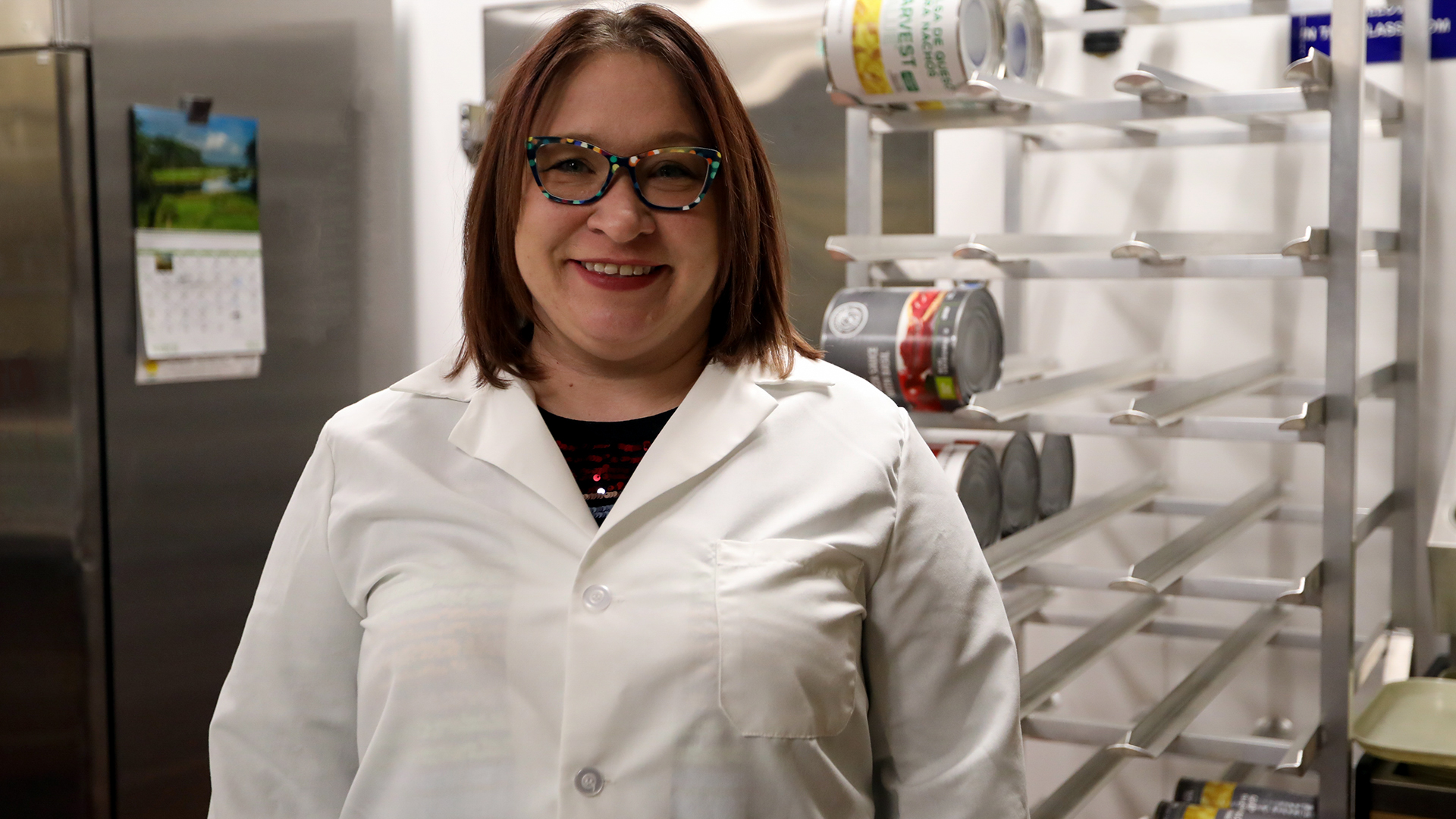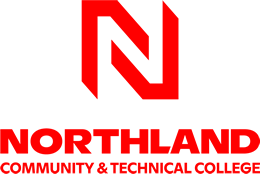Conversations
Learning for a Lifetime: Q&A with Dietetic Technician Program Director Angie Brekken
- By Kelly Jordet
- ·
- Photos by Chad Sperling
- ·
- March 29, 2022
The straight and narrow path isn’t for everyone–or the most interesting. Such is true for Angie Brekken, Program Director of Northland’s Dietetic Technician program. Taking advantage of online education options, this former Dietetic Technician, wife, and mother kept her eye on the ultimate goal as she navigated her way through her educational journey. She now shares her expertise with others like her across the country.
Angie: It’s a long and winding road! I didn’t pick the straight and narrow path toward my credentials. I started out thinking that I wanted to be a medical laboratory scientist and work in forensics. I decided that it wasn’t for me about two years into that program. I looked at the credits I already had completed and what program would make the most sense to transfer into. I knew that I didn’t want to be a nurse (no offense, nurses!) because I didn’t want to deal with the messy side of nursing. I was always interested in food and nutrition, so I decided to become a dietetic technician and completed the University of Minnesota Crookston’s program.
I worked as a dietetic technician for about eight years when my position was cut in half on my first day back from maternity leave. Needless to say, this was a shock! I found a different full-time DTR position and decided to go back to school online to become a registered dietitian. The program was through Rutgers in New Jersey. They took the experience and education of the DTR and worked that into their accelerated bachelor of science in health science (BSHS) program. The convenience of attending classes in the middle of the night or whenever else worked with my schedule was why I could go back to school while working full-time and caring for a 3-year old and infant. I wouldn’t have been able to become an RD without their online program. Once I completed the program, I decided that since I was in the learning groove, I might as well go on to earn my master of science (MS). So, I applied and was accepted to Eastern Michigan University’s MS in Human Nutrition program. I felt that this was an important degree because beginning in 2024, the minimum level of education to become an RD will change from a bachelor’s degree with 1200 internship hours to a master’s degree with 900-1200 internship hours.
Last May, I completed my most recent degree online and earned a doctorate in Educational Leadership from Minnesota State University Moorhead. I strongly recommend MSUM’s EdD program. I tailored my dissertation toward the nutrition and dietetics field and researched preceptorship within accredited nutrition and dietetics programs. Their program faculty and advisors went above and beyond and truly wanted us all to succeed.
The field of dietetics is so versatile; what are some of the most unconventional careers or places to work?
We see traditional settings such as long-term care facilities, hospitals, outpatient nutrition counseling, and food service management. However, Dietetic Technicians (DTR) & Registered Dietitians (RD) can also work in community health for programs such as WIC. They can work in health and wellness positions for companies and corporations. Retail nutrition and dietetics is an up-and-coming field where DTRs and RDs can help people right where they need it most – in the grocery aisles choosing their food items! They can work in daycare centers, school districts, correctional facilities, rehabilitation centers, gyms and health clubs, research, food labeling, etc. It depends on the individual’s area of interest for which direction they would like to explore.
What is new in the dietetics field?
For the majority of healthcare’s history, we have been treating ailments after they arise. There has been a focused shift towards preventative healthcare over the past decade. This means that if we change our lifestyles before an illness occurs, we can sometimes avoid the illness altogether. This is not always the case, and diseases will still develop, but we can take steps such as including more fruits, vegetables, lean proteins, and whole grains into our diets. We can decrease the amount of saturated fats that we eat. We can drink more no or low-cal beverages with minimal added sugars. And we can increase our movement. All of this can help us maintain a healthy weight, keep our hearts healthy, and decrease the risks of developing diseases such as Type 2 Diabetes and some forms of cancer.
It is vital to keep your finger on the pulse of public policy in nutrition and dietetics because that is where a lot of the funding for preventative healthcare measures comes from. Learning to be an advocate for public policy measures that affect food and nutrition is a large part of the community nutrition course within the dietetic technician program.
What does a prospective dietetic student look like?
A prospective dietetic technician student can be anyone interested in nutrition and dietetics. Most of our students in the program have been non-traditional students. This means that they are typically older than recent high school grads. Many have full-time jobs and families to care for. On the flip-side, we do have some fresh from high school students as well! This makes a great learning environment because we have people from various life stages coming together and learning from each other and not “just” from me.
Since we are an online program, a dietetic technician student in our program should have familiarity with computers and programs such as Microsoft Word, PowerPoint, and Excel. We use the internet and a learning platform called D2L Brightspace. So, there is a little bit of a learning curve to understand the platform, but after the first week of classes, students are usually pretty comfortable and ready to learn at times that are convenient for them. Some of those non-traditional students we talked about earlier are handing in assignments or taking quizzes in the middle of the night. And this is a wonderful example of how online learning meets the student where they are and fits into their schedules, which may not have otherwise allowed them to pursue their higher education goals.
Another perk to being an online program is our diverse student population from across the United States. This allows for a better understanding of social perspectives and growth for the students in the program.
Outside of teaching, how do you share your knowledge of food and nutrition?
I have talked with my children’s classrooms multiple times about nutrition. I am also a member of the Minnesota Academy of Nutrition and Dietetics. I have fulfilled many roles within this organization throughout my years of professional practice. I have been secretary for multiple terms, the Northwest Region President, I have presented research at the annual conference to fellow nutrition professionals and students, and I am currently the Education Director-Elect meaning that I get to play a large role in the team that puts the annual Minnesota conference and expo together, vetting presenters, planning the schedule, and submitting the continuing education certificate approval to the Academy of Nutrition and Dietetics. The Academy oversees each state’s affiliate organization.
I have written and reviewed registration exam test questions for the Commission on Dietetic Registration, which is the credentialing agency for dietetic technicians and registered dietitians. And I am excited about an upcoming nutrition counseling and education textbook publication where I co-wrote a chapter on Facilitating Group Learning. As a registered dietitian, I cannot stress enough how important it is to get involved and volunteer with your local, state, and national dietetic associations. The networking and opportunities that arise from these organizations are invaluable!
What other interests and hobbies do you have?
My top two are music and crochet. I constantly have a soundtrack going off in my head and often will start singing random lyrics based on something I just heard someone say. After I graduated with my MS in Human Nutrition, I was doing the typical “mom thing” of prompting the kids to clean their rooms, and my eldest said, “Don’t you have any homework to do?” This made me bust out laughing because, yes, I had been doing homework much of his life and often side-by-side with him at the dining room table as he did his. So, I took this as a prompt that I needed to learn a hobby. I took to YouTube and learned how to crochet, read, and write patterns and charts through the Crochet Crowd. If anyone wants to learn to crochet, I can’t suggest Mikey at the Crochet Crowd enough. He is wonderful. And this is just another example of how online learning can be invaluable. There is so much out there that can be learned online!
Now, I crochet pretty much every day, if even just for a few minutes. I find that it helps me unwind from the day, relax my brain, and it is almost like meditation. I like to listen to audiobooks as I crochet, too, so that I can do two things that I love at once. I’m thinking of trying to pick up knitting this summer. And maybe try a language app. It’s hard for me to keep my mind still. I constantly want to learn something new. Lastly, I love to go fishing. We bought an ice house last winter, and this is something that we had wanted to do for ages. So, that is what I spent a lot of spring break doing—unwinding in the fish house. We didn’t catch any “keepers,” but it sure was fun.
Can you tell us about your family?
I have been with my husband since high school. Over spring break, we celebrated our 28th year together and our 19th year married. We have two sons. One is a senior this year, and I don’t know where the time has gone and how it is possible that he will be an adult soon. And our second is in eighth grade and shares our love of fishing. We have two dogs, a little 6-year old Yorkie (that has a resting cranky face but is very loveable) and a 3-year old Weimaraner (who is wild and crazy and is attached to me like Velcro). We also have a salt-water fish tank that is my husband’s responsibility. Life is never dull around our house.





